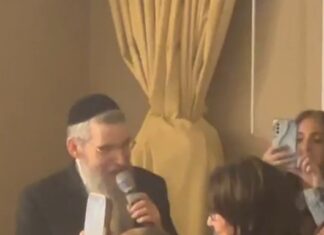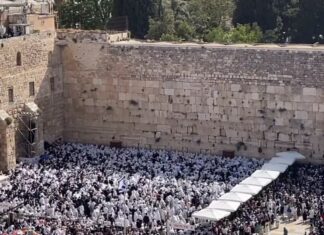Q: As an out-of-town girl, I often face difficulty dating due to my location on the map. Aside from the long-distance travel, many times families are hesitant to involve themselves with out-of-town families. Yet, we all know that Hashem is the true Shadchan, and if it is His desire, the shidduch will happen regardless of the long-distance travel.
A few months ago, a shadchan contacted me. She heard that I was in the New York area and just spoke to a boy who was suggested to me several times. Upon hearing that I was in town, the boy agreed to give me a yes. The shadchan was inquiring if I would be available to meet the boy for coffee. Although it was last minute, and after checking out a few points, I told the shadchan that I was available for a coffee date early the next morning.
I explained to the shadchan that I had a late-afternoon flight, but had time to meet for coffee in the morning. After hearing that I was leaving so soon, the shadchan responded to me, “I didn’t realize that you were going back already. I am thinking that it is not a good idea to go out if you won’t have the option of going out a second time. The boy raised the same concerns. Let’s wait until you are here next time.”
I replied that I was assuming that the boy was not really interested, because of course I would be able to come back if needed. After explaining her reasoning to me (I didn’t agree with it at all), she insisted that it was not a good idea to start with the shidduch.
I have three questions:
First, do you believe the shadchan acted the correct way? Second, it is my understanding that once a boy or girl has given a yes, it is incorrect to take back that yes. Do you believe that by the boy pushing off the shidduch, he was essentially taking back a yes? Thirdly, a coffee date does not guarantee a second date. When the shadchan used the term “coffee date,” it was my understanding that a coffee date is generally understood as one date and then it will be taken from there.
I actually saw this as a perfect opportunity for a coffee date. Is my understanding correct? If not, can you please define the term “coffee date.”
A: I will share some thoughts, which may not be clear-cut answers, based on previous life experiences as an out-of-town dater and my current work at YUConnects. Please allow me to refer to the way the questions are phrased with a bit of scrutiny. While the boy first said yes to meeting you for a cup of coffee when you were in town, maybe there was a time lag before you gave the yes, coupled with the fact that you had a flight that same day, giving little time to meet with a relaxed mindset and no chance for a second date on this trip. Perhaps the combination of these few new factors (after his initial yes) dissuaded him from meeting you on that specific day.
On the other hand, there were a few points you felt important to check into before giving a yes, so perhaps the timing of your yes was purposeful. Maybe if there was more time before your return, he would have felt that there was ample time for the cup-of-coffee date, plus maybe even a second date and possible potential. You don’t mention how far out-of-town you live, meaning, is it a one-hour flight or a six-hour flight? Over a border? This may have been an added variable in his mind, wondering how often or feasible it will be for you or him to travel to meet each other in the next few weeks.
To address your second question, I don’t believe that the boy is retracting his yes, but for now (on that day of your flight), he doesn’t seem to think that it is the best time to start this shidduch. I would ask the shadchan, as written in your question above, to please try the shidduch again as soon as you are both in the same town and both available at that time. These scenarios usually have a better chance of starting smoother when schedules are flexible, though I recognize that this is not always possible due to other commitments and responsibilities. Once potential develops, people are more amenable to travel more frequently to ensure relationships progress.
Nevertheless, as a shadchan, I would have tried (probably unsuccessfully, like the shadchan in your question, so no judgment) to encourage the boy to agree to a brief coffee date for a few reasons. For one, altz menschlichkeit and the mitzvah of bein adam lechavero, not slighting anyone, since the boy did say yes even for a moment, he should have been advised to keep his word and meet you, even if it was not an optimal situation. A rabbi of the boy’s choice could have been consulted on that day for his thoughts. I know, when asking my husband similar questions, that he advises that one always wins when he or she exhibits proper middos, even if it turns out later that it wasn’t a shidduch. (We ask girls to do the same, keeping their word after giving a yes even if they reverse a decision.)
Another valuable lesson my husband often shares with his students is that a date is shorter than all of the time spent contemplating back and forth, so just give it a try.
Secondly, with regard to your question, the shidduch has been suggested several times before, so maybe this idea has more weight and potential for compatibility. A cup-of-coffee relaxed date (a pressured date never works) could have given you both an opportunity to evaluate whether it has potential or not. Sometimes there are weeks or even months of preparation and enthusiasm surrounding a shidduch, and then the daters meet and it’s a no-go right from the start. While this outcome may be disappointing, we can then put this idea to rest and explore other more suitable ideas for each of you.
And thirdly, focused on a more optimistic outcome, what if there is potential in this shidduch and the coffee date would propel you to meet further? From my understanding, the operational definition of a coffee date is a less lengthy and less structured date, granting both participants an opportunity to see if they want to meet further, as you wrote, “to see if they want to take it from there.” It is, of course, still a date for talking tachlis, but it may not be as long or formal.
Tangentially, some shadchanim would opt for more coffee-like dates, shorter in nature, allowing daters to gain an impression to see if there is any interest and potential. Using this model, we may get more yeses if there was less of a long-term commitment and formality involved in a first date.
I recognize that this may not be suitable in all communities or situations, and we also have to account for the hours or days of preliminary research done before a first date. Yet, a variation of “it’s only a cup of coffee” format may invite more dating activity and ultimately more successful shidduchim.
I know of several daters who, after being drained from ongoing dating, have advocated for shorter, less-formal first dates. They posit that if we lower the formality and pressure a bit, they would be more agreeable to giving more new ideas a try. And as an added bonus to the overall flow and movement of shidduchim, if this coffee-date couple turns out not to be a shidduch, they can each go back to the shadchan with a “thank you so much for setting me up, but he or she wasn’t for me, and I have a great friend who would be more suitable for him or her…” The young ones know many more of their peers than some of us older shadchanim. (I group myself that way; no offense to any other shadchan.)
More like-minded daters meeting, even if for some reason the shidduch does not work out, leads to more targeted and new ideas for themselves and others in their peer group.
Another timely tangent, which has moved many out of their original comfort zone and has affected the formality of a first date, is the pandemic and its limitations on people’s travel plans cross country with the same ease as pre-COVID times. Doors have been opened and a flurry of engagements have been announced, as several have extended themselves and have agreed to first speak on the phone or meet over Zoom for a brief first date to maximize opportunities of suitable shidduchim during these challenging months.
But back to your question: When I was first suggested as a potential shidduch to my husband many years ago, it was at the beginning of the summer. He dated often that year and decided to take a breather from dating that summer and focus on learning up at Morasha Kollel. We didn’t meet that summer and each of us dated other people for another year.
The next summer, I flew back to New York, again for a summer program (I was out an out-of-towner too!) and this shidduch idea resurfaced. This time, the same shadchan asked him on a Thursday night, which was a few days before he was going up again to Morasha Kollel to learn for another summer. The shadchan wisely said to him, “Just meet her for a short date before you go up to the mountains, to see if there is any potential.” Again, he was hesitant to start seeing anyone before his long-awaited summer, so he agreed that if we were able to meet on Friday morning for a brief date (cup-of-coffee-like), he would give it a try.
I easily agreed as I had already heard about him the previous year. We went out Friday morning, and then we went out the next night, Motzei Shabbos, too (for another short date, as the zeman of Rabbeinu Tam was close to 10 p.m.).
We met two more brief times in the next few days before he drove up to the mountains to learn. When we parted and he relayed that he would drive down for a subsequent Shabbos to meet again, I turned to him and said, “I feel badly. I understand that the drive up and down is close to three hours each way.” His reply was, “Yaakov worked for Rochel for seven years. I can drive three hours each way as part of my hishtadlus.” A few months later we were engaged, baruch Hashem. If not for that push of “just meet her for a cup of coffee on Friday and see…” we might have not been another example of the famous Abie Rotenberg “Journeys” song, “And the shadchan said, ‘This time it will be different…’”
Rebbetzin Dr. Efrat Sobolofsky is director of YUConnects. She and her husband, Rabbi Zvi Sobolofsky, live in Bergenfield and lead Congregation Ohr HaTorah community.












